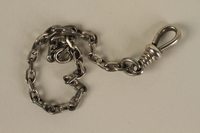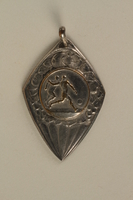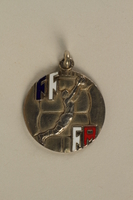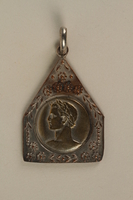Overview
- Description
- The Max and Rose Feld papers contain documents and photographs relating to Max and Rose Feld, a deaf married couple and their daughter Esther. The Feld family lived in Paris, France, before Max was taken to Beaune-la-Rolande before being sent to Auschwitz. Rose and Esther were kept hidden by a number of families in Paris and the countryside, before the war ended and they immigrated to the United States. Included in the collection are various items relating to identification and immigration, such as marriage certificates, identity cards, passports, visa applications, affidavits, and other items. Also included are photographs of the Feld family, as well as Max and Rose’s parents prior to the war, and of Esther as a child.
The Max and Rose Feld papers contain documents and photographs from their time at school in Berlin, to living married in France, to Rose and Esther’s time in hiding from the Germans and subsequent immigration to United States after the war. Included in the documents are birth certificates for Esther, marriage certificates for Max and Rose, and numerous identification documents such as work passes, membership cards, and Rose’s Polish passport. The immigration papers include applications for visas, an affidavit, and Rose’s naturalization certificate for the United States. Other items include documents pertaining to Max Feld’s death in Auschwitz and receiving reparations, an insurance registration card for Rose, and a copy of the bylaws for the Organization of Jewish Deaf in Berlin. The photographs in this collection are primarily of the Feld family, with some photos of Max and Rose and Esther as a newborn. Other photos are of Max Feld’s parents and brothers, and Rose’s parents and sisters, photos of Max while he was imprisoned in the Beaune-la-Rolande internment camp. Some photos are post-World War II, and show Rose along with her sister, mother, and Esther traveling to the United States and Caracas, Venezuela. The oversized folder contains several sheets from a photo album of Esther as a child in France, South America and the United States. - Date
-
inclusive:
1905-1989
bulk: 1905-1957
- Credit Line
- United States Holocaust Memorial Museum Collection, Gift of Esther Feld Weisel
- Collection Creator
- Feld family
- Biography
-
Raisa (Rose) Szteinberg was born in Pinsk, Poland in 1917 to Michel and Tauba Szteinberg. She had two other sisters; Clara and Alexandria (Sara). When she was five, the Szteinberg family moved to Warsaw, Poland. Rose was born without hearing, and attended a school for the deaf, but her parents were not pleased with the school. Rose was sent to a school for the Jewish deaf in Berlin. While there, she met Max Feld, a deaf classmate. The two attended school until graduation in 1932. Towards the end of their enrollment, the two began to date, and continued even after Rose’s departure back to Warsaw with her family. The Szteinberg family moved again in 1933 to Paris, France, in response to the rise of anti-Semitism spreading through Poland. Max Feld, continued to live in Berlin, until he was forced to leave the country as a refugee. Max, his parents Wolf and Martha, and his brothers Sidney and Alfred, all moved to Paris as well. Max later married Rose, and in 1941, Rose gave birth to Esther. Only a few months later, the occupation of France began, and the Gestapo took Max to Beaune-la-Rolande internment camp. Rose visited him several times at the camp, before Max was eventually sent to and killed at Auschwitz. In the meantime, Rose worked at a coat factory for the Germans in Paris, before going into hiding along with her mother Tauba, her sister Sara, and Esther, thanks to the aid of friends Marcel and Marcella Demay. Soon, Rose and her family traveled to Villepinte and stayed with several other families. For a time, the Treme family took in Esther while Rose, Tauba and Sara stayed in the farmhouse. They stayed hidden until the end of the war. Soon after, the family attempted to gain visas to Venezuela and the United States. They attempted to go to New York but arrived in Galveston, Texas, before eventually making it to their intended destination. Their stay was temporary though, and the family moved to Caracas, Venezuela, for three years, until Rose met Ted Rosman in 1950 on another trip to New York City. The two married and Rose and Esther were granted US citizenship.
Physical Details
- Genre/Form
- Photographs. Documents. Identification cards. Passports. Affidavits. Certificates. Marriage certificates. Birth certificates.
- Extent
-
13 folders
1 oversize folder
- System of Arrangement
- The Max and Rose Feld papers are arranged as two series:
•Series 1: Documents, 1934-1989
•Series 2: Photographs, 1905-1947
Rights & Restrictions
- Conditions on Access
- There are no known restrictions on access to this material.
- Conditions on Use
- Material(s) in this collection may be protected by copyright and/or related rights. You do not require further permission from the Museum to use this material. The user is solely responsible for making a determination as to if and how the material may be used.
Keywords & Subjects
- Topical Term
- World War, 1939-1945--Refugees--France. World War, 1939-1945--Children--France. Holocaust, Jewish (1939-1945)--France--Paris. Holocaust, Jewish (1939-1945)--Deaf--Germany. Holocaust, Jewish (1939-1945)--Deaf--France. Jews--France--History--20th century. Jews--Deaf. Jews--Germany--Berlin--Deaf. Deaf.
- Geographic Name
- Warsaw (Poland) Berlin (Germany) Paris (France) Villepinte (France) Galveston Island (Tex.) New York City (N.Y.) Caracas (Venezuela)
Administrative Notes
- Holder of Originals
-
United States Holocaust Memorial Museum
- Legal Status
- Permanent Collection
- Provenance
- The Max and Rose Feld papers were donated to the United States Holocaust Memorial Museum by their daughter Esther Weisel, in 2005.
- Record last modified:
- 2022-07-28 17:49:53
- This page:
- https://collections.ushmm.org/search/catalog/irn42998
Additional Resources
Download & Licensing
In-Person Research
- Available for Research
- Plan a Research Visit
-
Request in Shapell Center Reading Room
Bowie, MD
Contact Us
Also in Max Feld and Rose Feld-Rosman collection
The collection consists of artifacts, documents, and photographs relating to the experiences of Max Feld and Raisa Steinberg in Germany and Poland before the Holocaust and in France with their daughter, Esther, during and after the Holocaust.
Date: 1907-1957

Silver metal cable link chain used to hold sports medals awarded to a German Jewish deaf-mute athlete
Object
Chain used by the Feld family to hold sports medals awarded to Max Feld. Max competed in several deaf-mute athletic competitions in the 1930s in Berlin and Paris. In 1938, he left Germany for Paris to be with Raisa Steinberg, whom he had met when they were students at the Israelite School for the Deaf in Berlin. They married in 1939, and had a daughter, Esther, in 1940. Paris was occupied by the Germans in the summer of 1940 and foreign Jews were targeted for arrest. In May 1941, Max was sent to Beaune-la-Rolande interment camp; in July 1942, he was deported to Auschwitz-Birkenau concentration camp. Raisa went into hiding with Esther in July 1942 in the countryside outside Paris. They returned to Paris after it was liberated by Allied Forces on August 15, 1944. Max was reported as missing. Several years later, Raisa learned that Max had been killed in Auschwitz-Birkenau in September 1942.

French Deaf-Mute National Cup soccer medal awarded to a German Jewish athlete
Object
FSSMF [La Fédération Sportive des Sourds-Muets de France (French Deaf Mute Sports Federation)] National Cup soccer medal awarded in 1938 to Max Feld. In 1938, he left Berlin for Paris to be with Raisa Steinberg, whom he had met when they were students at the Israelite School for the Deaf in Berlin. They married in 1939, and had a daughter, Esther, in 1940. Paris was occupied by the Germans in the summer of 1940 and foreign Jews were targeted for arrest. In May 1941, Max was sent to Beaune-la-Rolande interment camp; in July 1942, he was deported to Auschwitz-Birkenau concentration camp. Raisa went into hiding with their 1.5 year old daughter, Esther, in July 1942 in the countryside outside Paris. They returned to Paris after it was liberated by Allied Forces on August 15, 1944. Max was reported as missing. Several years later, Raisa learned that Max had been killed in Auschwitz-Birkenau in September 1942.

French Deaf-Mute National Cup basketball medal awarded to a German Jewish athlete
Object
National deaf-mute championship basketball medal awarded in 1938 to Max Feld. In 1938, he left Germany for Paris to be with Raisa Steinberg, whom he had met when they were students at the Israelite School for the Deaf in Berlin. They married in 1939, and had a daughter, Esther, in 1940. Paris was occupied by the Germans in the summer of 1940 and foreign Jews were targeted for arrest. In May 1941, Max was sent to Beaune-la-Rolande interment camp; in July 1942, he was deported to Auschwitz-Birkenau concentration camp. Raisa went into hiding with Esther in July 1942 in the countryside outside Paris. They returned to Paris after it was liberated by Allied Forces on August 15, 1944. Max was reported as missing. Several years later, Raisa learned that Max had been killed in Auschwitz-Birkenau in September 1942.

Deaf-mute sports team medal awarded to a German Jewish athlete
Object
Sports medal awarded in 1938 to Max Feld. In 1938, he left Germany for Paris to be with Raisa Steinberg, whom he had met when they were students at the Israelite School for the Deaf in Berlin. They married in 1939, and had a daughter, Esther, in 1940. Paris was occupied by the Germans in the summer of 1940 and foreign Jews were targeted for arrest. In May 1941, Max was sent to Beaune-la-Rolande interment camp; in July 1942, he was deported to Auschwitz-Birkenau concentration camp. Raisa went into hiding with Esther in July 1942 in the countryside outside Paris. They returned to Paris after it was liberated by Allied Forces on August 15, 1944. Max was reported as missing. Several years later, Raisa learned that Max had been killed in Auschwitz-Birkenau in September 1942.
Unused yellow cloth Star of David badge with Juif for Jew issued in Paris
Object
Unused Star of David badge owned by 25 year old Raisa Steinberg Feld in Paris, France, in May 1942. Jews in France were required to wear these on their outer clothing at all times after May 1942; badges were often cut from a pre-printed roll. After Paris was occupied by Germany in May 1940, foreign Jews were in danger of arrest and imprisonment. Raisa and her husband, Max, both deaf, were Jewish refugees from Poland and Germany. In May 1941, Max was arrested and, in July 1942, deported to Auschwitz-Birkenau concentration camp. Raisa went into hiding with their 1.5 year old daughter, Esther, her sister, and her mother in the countryside outside Paris. They returned to Paris several months after it was liberated by Allied Forces on August 15, 1944. Max was reported as missing. Several years later, Raisa learned that Max had been killed in Auschwitz-Birkenau in September 1942.
Yellow cloth Star of David badge with Juif for Jew worn by a Polish refugee in Paris
Object
Star of David badge worn by 25 year old Raisa Steinberg Feld in Paris, France, from June 1942. Jews in France were required to wear these on their outer clothing at all times after May 1942; badges were often cut from a pre-printed roll. After Paris was occupied by Germany in May 1940, foreign Jews were in danger of arrest and imprisonment. Raisa and her husband, Max, both deaf, were Jewish refugees from Poland and Germany. In May 1941, Max was arrested and, in July 1942, deported to Auschwitz-Birkenau concentration camp. Raisa went into hiding with their 1.5 year old daughter, Esther, her sister, and her mother in the countryside outside Paris. They returned to Paris several months after it was liberated by Allied Forces on August 15, 1944. Max was reported as missing. Several years later, Raisa learned that Max had been killed in Auschwitz-Birkenau in September 1942.
Watercolor greeting card of his barracks at Beaune-la-Rolande created by a camp inmate
Object
New Year’s greeting card created by 27 year old Max Feld of the barracks where he lived while imprisoned at Beaune-la-Rolande internment camp in France from 1941-1942. Max made the card for his wife, Raisa, and their daughter, Esther, and it includes a handwritten message wishing them “a happy and healthy year.” After Paris was occupied by Germany in May 1940, foreign Jews were in danger of arrest and imprisonment. Max and his wife, Raisa, both deaf, were Jewish refugees from Germany and Poland. In May 1941, Max was arrested and, in July 1942, deported to Auschwitz-Birkenau concentration camp. Raisa went into hiding with their 1.5 year old Esther, her sister, and her mother in the countryside outside Paris. They returned to Paris several months after it was liberated by Allied Forces on August 15, 1944. Max was reported as missing. Several years later, Raisa learned that Max had been killed in Auschwitz-Birkenau in September 1942.



